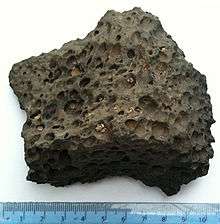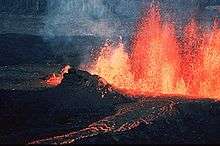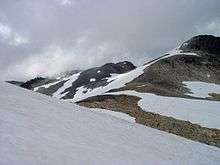Cinder

Example of a cinder, found at Amboy Crater

Volcanic eruptions such as this one can create cinders.

Volcanic cinder in the Mount Cayley volcanic field, British Columbia, Canada
A cinder is a pyroclastic material. Cinders are extrusive igneous rocks. Cinders are similar to pumice, which has so many cavities that its low density of 0.641g/cm^3 allows it to float in water. Cinder is typically brown, black, or red depending on its chemical content. A more modern name for cinder is scoria.
Characteristics
The following geologic characteristics define a cinder:
- Uncemented
- Vitric
- Having bubble-like cavities, called vesicles
- Measuring not less than 2.0 millimeters in at least one dimension
- Apparent specific gravity between 1.0 and 2.0
- Typical cinders are red or black in color.
- Contain numerous gas bubbles "frozen" into place as magma exploded into the air and then cooled quickly.
Uses
Cinders have been used on track surfaces and roads to provide additional traction in winter conditions. Cinders are also employed as inorganic mulch in xeriscaping, because of excellent drainage properties and erosion resistance. In this context, they are referred to frequently with the name "lava rock".
See also
This article is issued from
Wikipedia.
The text is licensed under Creative Commons - Attribution - Sharealike.
Additional terms may apply for the media files.